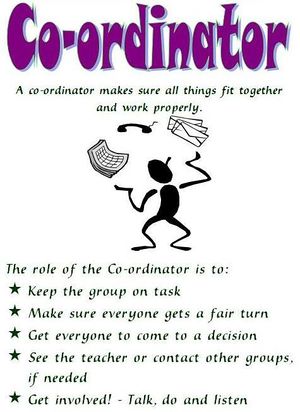STIC:Group work roles workshop
Jump to navigation
Jump to search
Group work roles workshop
- Daniel K. Schneider, TECFA, Faculty of psychology and educational sciences, University of Geneva
- Workshop notes
- Master in Innovation, Human Development, and Sustainability
- Geneva, July, 2017
Objectives
Background
- Group work leads to better results when participants are given roles for which they will be held accountable. In addition group work should be driven by scenarios, i.e. activities that engage participants in tasks where they use tools and resources and produce outcomes. Degree of such "scaffolding" can vary according to learning goals and teaching philosophy.
- Physical visualizations (or physicalizations) can promote cognition through a variety of mechanisms, notably easier perception, hands-on manipulation and enhanced interaction with other participants. We can distinguish several types of physical visualizations, according to three dimensions: active/passive, kit/whole, digitally enhanced/non digital. In this workshop we will focus on creating a simple set of tokens useful for group animation.
- Construction kits allow creating and manipulating visualizations from building blocks. In education, construction kits, also known as expressive media or manipulatives, allow interactive exploration of designs, concepts and roles.
In this workshop we will:
- shortly discuss why assigning roles to group workers can be beneficial, in particular in education
- shortly discuss why physical tokens are better than simple verbal instructions
- make you think about future "outreach" activities to plan within your project
- have you create a paper (or other) prototype to organize group work (of your future "clients")
Group work roles
Roles for group work are defined in many contexts. In education, there are two different sorts of roles.
- Most pedagogies rather focus on managerial roles, i.e. give a specific management task to each or only to some group member(s). All team members will contribute to all or most parts of the project.
- Some pedagogies (typically technical development) identify specialist roles, i.e. organise the group as a multi-disciplinary team where each team member contributes to a part of the project.
In this workshop we will focus on the first case, although you are allowed to define "specialist" roles.
Examples you can look at (but not spend too much time on this !!)
Below is an example of token presented in the form of a card that you typically would find doing the google images search above.

Source: Co-operative groups, MargD Teaching Posters
Feel free to come up with other solutions than cards, e.g. a 3D structure. If you copy designs, make sure that they their license allows you to do so (!)
HANDS ON: prototyping
- Be fast. This is just a prototyping activity. Ask the instructor and other persons in the room for help.
- Notice that this workshop itself is an example of a design activity. It includes two learning goals (manage group activities, design tangible teaching objects), an outcome (a set of group role prototypes), and three tasks. Consider distributing roles (leader, note taker, presenter, timekeeper) among yourselves ....
Part I - scenario design (20 minutes)
- Imagine that you will bring your project to a school (or if not possible, to another environment) where children (or other participants) will engage in some group activity that you will organise.
- Shortly design a scenario, i.e. a group learning activity that defines an objective in terms of learning and an measurable output that should result from the activity
- Objective = ...
- Outcome = ...
- Task list = ....
Part II - define a role set (20 minutes)
- Define roles that will help the group to be more efficient
- Name = ....
- Purpose = ....
- Tasks = ....
- Create a physical prototype that will summarize each role. Use pen and paper or anything else that is physical.
Part III - debriefing (20 minutes)
- At the end of the workshop, each group will present their solution in 2 minutes.
Bibliography
- Zuckerman, Oren (2006, in preparation), Historical Overview and Classification of Traditional and Digital Learning Objects MIT Media Laboratory, https://llk.media.mit.edu/courses/readings/classification-learning-objects.pdf (accessed July 2016).